Buying through this banner helps support the forum!
-
Artist and Bibliophile

Nice thoughts Auntie... but I'm afraid your concept of intellectual property rights is something from a couple centuries ago that is rapidly coming to an end. All you are doing is acting (unwittingly?) in support of greedy corporations that have been overcharging for their products for years.
Certainly you are aware of this well known poem:
APRIL is the cruellest month, breeding
Lilacs out of the dead land, mixing
Memory and desire, stirring
Dull roots with spring rain.
Winter kept us warm, covering 5
Earth in forgetful snow, feeding
A little life with dried tubers.
Summer surprised us, coming over the Starnbergersee
With a shower of rain; we stopped in the colonnade,
And went on in sunlight, into the Hofgarten, 10
And drank coffee, and talked for an hour.
Bin gar keine Russin, stamm' aus Litauen, echt deutsch.
And when we were children, staying at the archduke's,
My cousin's, he took me out on a sled,
And I was frightened. He said, Marie, 15
Marie, hold on tight. And down we went.
In the mountains, there you feel free.
I read, much of the night, and go south in the winter.
What are the roots that clutch, what branches grow
Out of this stony rubbish? Son of man, 20
You cannot say, or guess, for you know only
A heap of broken images, where the sun beats,
And the dead tree gives no shelter, the cricket no relief,
And the dry stone no sound of water. Only
There is shadow under this red rock, 25
(Come in under the shadow of this red rock),
And I will show you something different from either
Your shadow at morning striding behind you
Or your shadow at evening rising to meet you;
I will show you fear in a handful of dust. 30
Frisch weht der Wind
Der Heimat zu.
Mein Irisch Kind,
Wo weilest du?
T.S. Eliot employed a wide array of fragments "stolen" from others. The most obvious here being the final 4 lines in German, taken from Richard Wagner's opera, Tristan und Isolde. No one would think to accuse Eliot of plagiarism... unless he were to have written The Wasteland today. Corporations, sensing their eminent loss of income from outdated laws are desperately attempting to enforce these laws in almost Draconian manner.
One of the most important artistic developments of the 20th century was that of collage/montage. New... "original" works of art were created from fragments of pre-existing works:
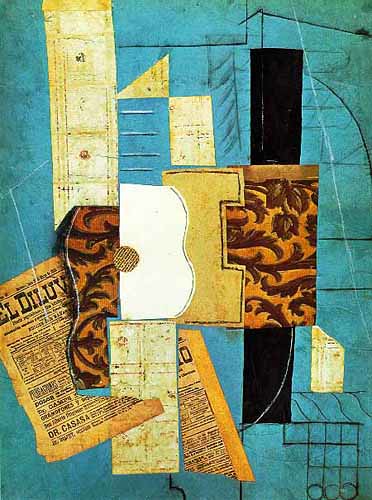
Picasso employed fragments of imagery taken from newspapers, wallpapers, magazines, etc... While there are rarely any figurative "images" the texts and wallpaper designs were certainly protected under copyright law and Picasso's intention was to blur the gap between art and "reality".
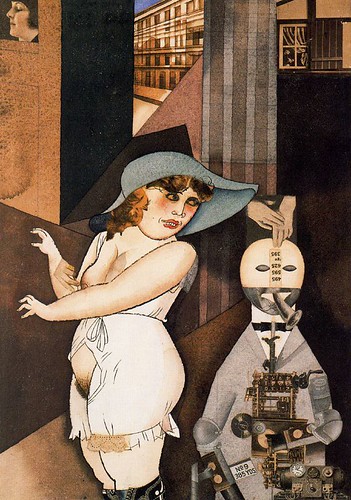
Artists such as George Grosz employed imagery from newspapers and magazines in political art... again using imagery from pre-existing sources.
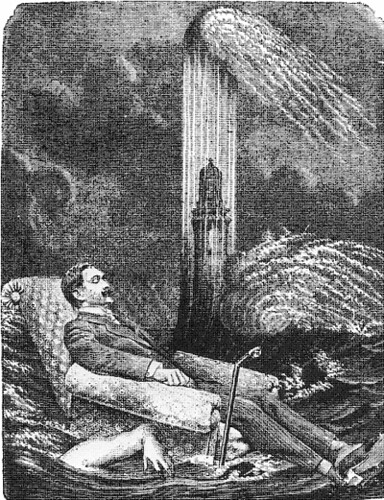
The Surrealists, such as Max Ernst, employed pre-existing imagery as a palette from which to pick and choose at random.
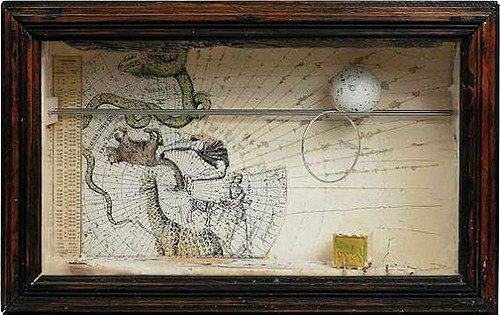
Joseph Cornell, one of the most original and influential of American Modernists "recontextualized" images and objects... placing them in a new context to change their meaning.]
Nearly all of these examples would be considered "illegal" today in some camps.
Collage and Montage really took off in the late 1950s and 1960s as Pop Artists began to employ imagery taken from popular culture as a means of commenting upon popular culture. Imagery was "taken" from advertising, pin ups, film and television, popular music, pornography, etc...


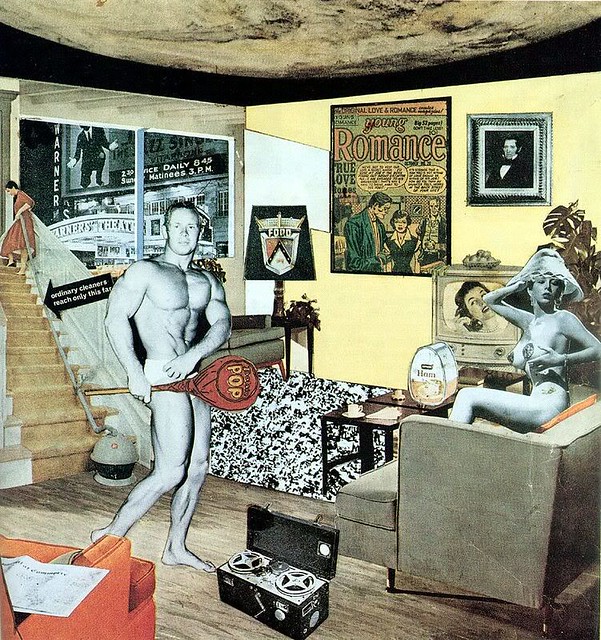


The most well-known example of art based upon "appropriation" (to use the art critical terminology) most certainly was Andy Warhol who created icons of our modern consumer culture from soup cans and film stars:
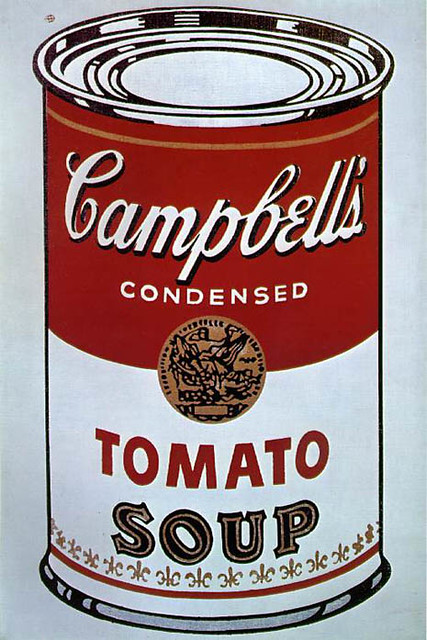

The most comic irony of your argument that such laws aren't all about the money is underscored by the instance of Warhol himself. Warhol never asked to use the copyright protected images he employed in his paintings. It was understood that by changing the imagery he was engaging in a form of criticism (placing the work under "fair use" law)... beside which... nobody really cared about an artist hijacking intellectual "property" from huge corporations. Yet late in his career Warhol created these:
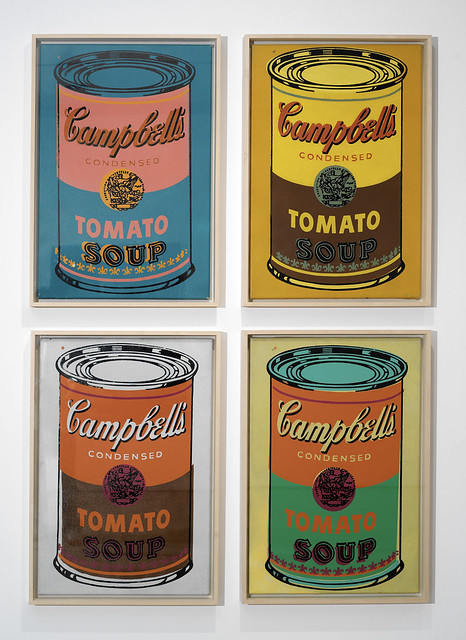
When years later the Campbell's Soup Company decided to release a limited edition of cans inspired by Warhol's work, they had to pay a pretty penny for the use of imagery stolen from them by Warhol:
[IMG]esguild1, on Flickr"><img src="http://farm6.static.flickr.com/5027/5696625283_d7305c1c2c.jpg[/IMG]
As we moved into the 1990s and beyond there has been a development of an outsider movement in the arts known as Pop Surrealism. The Pop Surrealists reject most of the esoteric developments of high art of the last 50 years, and instead embrace both high art and popular culture... blurring the line between the two. Their art employs imagery taken from comic books, cartoons, anime, pornography, television, art history, etc...
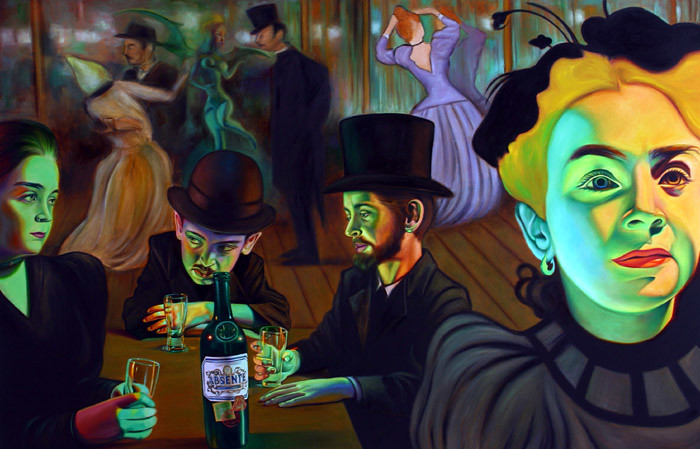
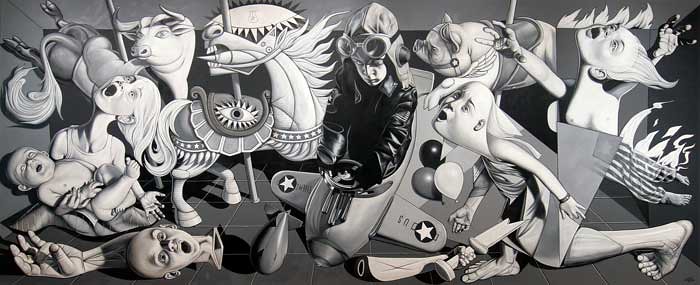
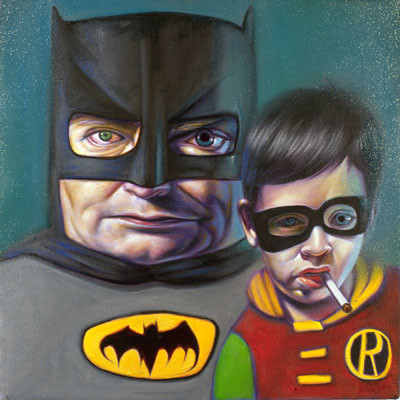



The problem with the intellectual property rights laws is that they have no clearly defined boundaries with regard to art work employing "appropriations" in the creation of something that is truly "new". The laws clearly favor whoever has the "deepest pockets". Perhaps one of the most famous recent infringement cases concerned the artist, Shepard Farie's famous Obama "Hope" poster:
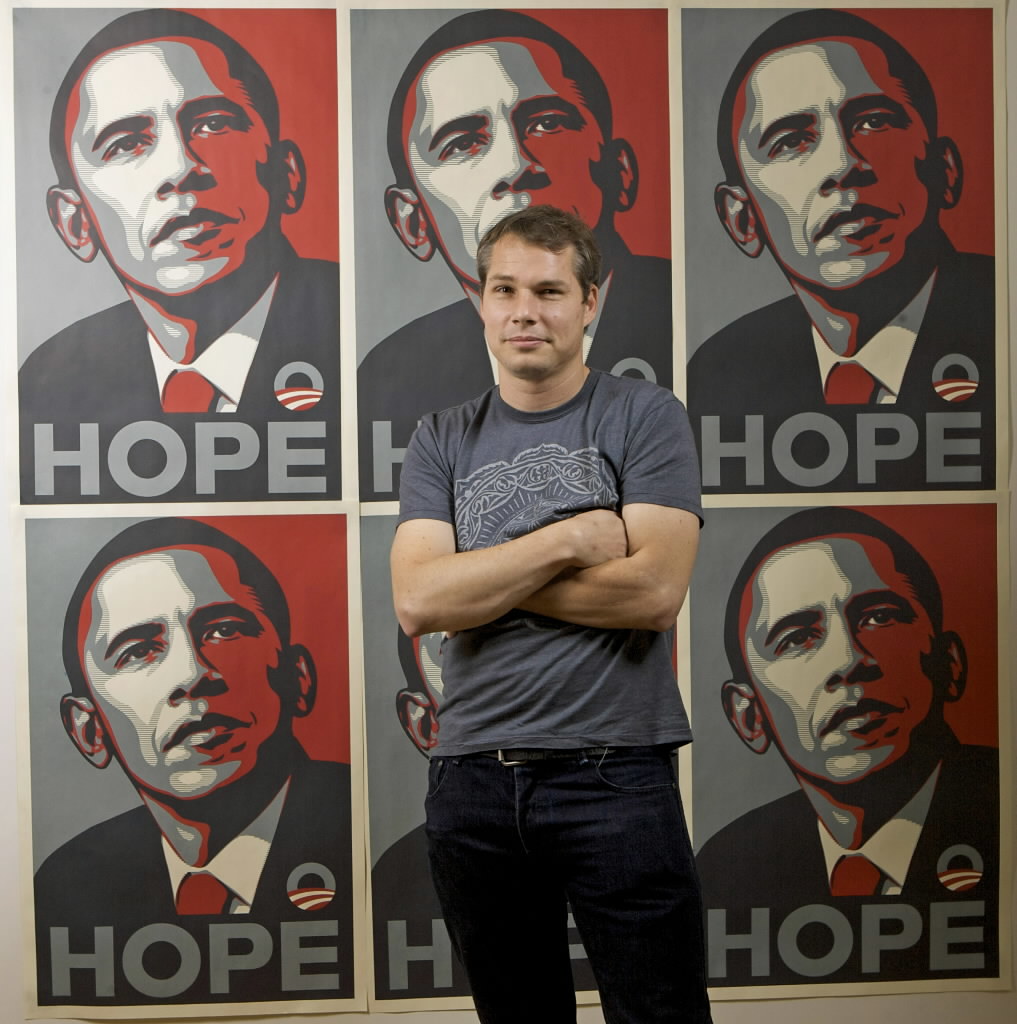
Under "fair use" laws imagery employed for critical purposes or a political commentary is exempt from copyright. This is what allows MAD Magazine or Saturday Night Live to parody characters from film and television. Fairie clearly employed this photograph from the Associated Press:

In theory, the poster should have been exempt from accusations of copyright infringement as political commentary. The artist did not even make any money off the work, having donated his efforts. AP, however, has deep enough pockets and smelled money to be made from subsequent sales of the poster.
To further emphasize that its all about the money, we might look at Damien Hirst. Hirst is one of the wealthiest artists currently at work... one of the bad boys of art. A site here shows all the art that Hirst "stole" from others:
http://www.stuckism.com/Hirst/StoleArt.html
Pathetically, a couple of years ago a 16-year old boy started creating collages using images from Hirst which were essentially critical comments or Parodies of Hirst. He sold some of these on E-Bay for $50 a pop. Hirst slapped the boy with a "Cease and Desist" suit and a lawsuit seeking millions in compensation for damage to his reputation. Hirst could be such a blatast a$$ because he has the money to enforce his view of copyright law... even if he is wrong.
Few writers or musicians make any real money off the sale of records or commercial downloads. A good many support putting their work on line for all to have free access because the recognize that this is a form of free advertisement that will pay off for musicians in increased audiences and also lead to increased sales for most lesser-known writers. The reality is that copyright law as it is currently employed is meant only to defend the gross profits of a few superstars (actors, directors, musicians, authors) and more importantly, the corporate middlemen. When one considers that actual cost of production of a CD or a book... even including the artist's share... one cannot help but recognize the price gouging that has been going on for years.
As technology evolves it becomes ever increasingly difficult... if not downright impossible for corporations to enforce copyright laws based on an outdated reality. We've all heard or read of the Draconian attempts at copyright protection. There's the instance of the British equivalent of ASCAP or BMI attempting to charge an elderly woman for whistling show tunes while she worked (thus entertaining others illegally?). There was the artist Richard Serra who insisted that any change in the context of his sculpture amounted to a change in the work itself... thus he felt he should have the right to deny construction of new building in NYC near his public sculpture. Then there are the architects who believe that they should own the sole rights to the representation of their buildings... thus no snapshots posed in front of this or that building while touring New York or Paris. The internet itself would virtually cease to function if we were to strictly adhere to copyright law.
Pictures, by the way, are certainly included in copyright law... but there are certain stipulations. The Supreme Court ruled that a reproduction that seeks to reproduce as accurately as possible an original work of art (a painting, sculpture, photograph, etc...) cannot be afforded copyright protection because it lacks any real attempt at originality. If the photographer were to employ a dramatic angle, or lighting, or pose their spouse before the Mona Lisa, such an image would indeed be open to copyright protection, but not otherwise. The original image, however, may still be under copyright protection even if the reproduction photograph were not. Then one must consider how the image is used and "fair use" law.
Beware of the man with just one book. -Ovid
The man who doesn't read good books has no advantage over the man who can't read them.- Mark Twain
My Blog: Of Delicious Recoil
http://stlukesguild.tumblr.com/

-
Registered User

Wow! You said everything my brain could not possibly say when it comes to pictures! Thanks so much. I notice on american shows, models, brand and logo names are often blurred in the footage and I can only assume it is because of the strong arm of copyright infringement laws in the US. If somebody don's a Coke adds life t-shirt during a take of Neighbours, nobody gets antsy about it. It's advertising, not plagiarising.
Before sunlight can shine through a window, the blinds must be raised - American Proverb
-
Registered User


Originally Posted by
stlukesguild

The problem with the intellectual property rights laws is that they have no clearly defined boundaries with regard to art work employing "appropriations" in the creation of something that is truly "new". The laws clearly favor whoever has the "deepest pockets". Perhaps one of the most famous recent infringement cases concerned the artist, Shepard Farie's famous Obama "Hope" poster:

Under "fair use" laws imagery employed for critical purposes or a political commentary is exempt from copyright. This is what allows MAD Magazine or Saturday Night Live to parody characters from film and television. Fairie clearly employed this photograph from the Associated Press:

In theory, the poster should have been exempt from accusations of copyright infringement as political commentary. The artist did not even make any money off the work, having donated his efforts. AP, however, has deep enough pockets and smelled money to be made from subsequent sales of the poster.
Corporations Have Screwed Us, but the Baby deserves clean Bathwater, etc.
There certainly are problems with copyright laws, but it doesn't mean that they should be abandoned. Some people might have trouble imagining a world in which copyright protection could continue and usefully be enforced, but it's basically a matter of how the technology is set up. It should be possible to keep it as well-enforced as it was back in the days of cassette tapes (ie., not a 100% successful enforcement, but a lot better than a simple ***-to-the-sky 100% surrender to those who are selling hard-drives, search engine ads, bandwidth, and all of the other things we use to enjoy and perhaps even "stockpile" images, music, software, text, and other digitizable forms of human creativity). There will be problems (people will be passing flash-drives to friends), but they could be limited--wide-scale sharing of copyrighted material over networks need not be ignored, neither by law, nor by technological design, and this is a precedent that is currently being set (prosecution of offenders, approved app environments like the ipad).
Is Shepard Fairey An A-Hole?
Regarding Shepard Fairey, I don't see any reason at all that the AP photographer (or, as his contract would stipulate, I assume, the AP itself) shouldn't get 50% of whatever cash or "attention" that Obama print has gotten. I think it would probably count as an effective method for Fairey to get his name out there (I certainly had never heard of him before...)--he can expect money from increased sales and attendance in regard to his other works.
Is it OK to make this self-promotion something that AP has no recourse to receive payment for? If they should get something, how much? If nothing (since he made it freely available), well that's just a nice loophole for Fairey or whatever. SOMETHING could be arranged, though, and with more cases, maybe it will become easier to get more consistent rulings. Perhaps attention will become sufficient to bring about new and carefully debated, specific legislation, etc. Not that it would become *completely* nailed down, but that isn't the only way to judge the usefulness of an effort. (And yes, a particularly important part of the effort would be directed at the ridiculous legislation that media corporations have promoted and brought about.)
Anyhow, at the very least, shouldn't the the photographer or AP get credit for providing the image that was "appropriated"? Because Fairey wasn't interested in that. He denied using any existing photo, and eventually admitted to destroying evidence, trying to hide the fact that he had used the AP photo (which led to his lawyers abandoning him). He's the perfect poster boy for the (sometimes) dishonest, intellectually confused, and overblown attitude of (some of) these "posterboys". Frankly, I was impressed by his appearances in that recent Banksy movie (it isn't easy doing all of that graffiti, and the "journey" was interesting on film, at least), but the guy has some problems, as well.
Here's an examination of some of his art that is pretty interesting, and I strongly recommend it if you want to see how "appropriation" figures in his art; his attitude towards the artists from whom he appropriates; and what this situation likely results in vis-a-vis his audience's experience and understanding of his "creativity":
http://www.art-for-a-change.com/Obey/index.htm
Precedents
Technology is making it easy to duplicate stuff. Our lives are becoming increasingly digitized. 3-D printers exist, and will be increasingly found in homes. Robots will be doing more and more for us. Can't we at least expect our human creativity to have importance and value, as we move forward? Or must we just sacrifice the rather nice idea that an "idea" can have value. Patent and copyright laws certainly need to be modified (just look at what Disney has done), but they provide a bulwark against a culture that might increasingly value appropriation, in a technological landscape that would be more than happy to accommodate such trends. Of course artists and inventors have been "stealing" from each other forever--is creativity always a case of mixing and matching, perhaps? Um, actually, probably--at least on some level? But the point is that useful lines can be drawn, and certain practices simply seem logical (e.g. you re-color a photo, you don't pretend there was never a photo.).
Which People Are In The Driver's Seat? And Do The Passengers Get Airbags?
Yes, back to Fairey, and his media-spotlight jackpot. Clearly, by making the Obama print free, he manages to get more attention, and financially wins in the end (at the gallery). It's a nice trick, and, similarly, the internet makes it easy for musicians to get more people at their concerts, etc. For novelists, the news isn't so good, however. And, really, if it is such a good tactic, why not let the artist choose to use it, instead of forcing them to (i.e., because we've decided to take a back seat to technological imperatives-- those things that the tech gurus and technology corporations can most efficiently do "for us" at the moment, and the easiest stuff that comes next, etc.)?
Let the musicians stream their work (if they want people to hear it before buying, or attending a show), and don't let people put the mp3's out there on massively-shared torrents with assured impunity. Unless the musician wants it out there like that. Let the author provide the first 5 chapters for free, or whatever. Let the artist choose the resolution that might be freely available. Give the programmer some protection against those people widely sharing registration numbers, etc. People will find a way to record streamed music (or, of course, get full-quality copies from a friend's flash drive). The "solution" won't be perfect. It hasn't been perfect as long as I've been around.
EDIT: It turns out that Shepard Fairey had claimed to have used a *different* photo as the basis for his Obama print, but claims to have gotten things mixed up. THEN, after realizing that AP was right about the matter, he went on to destroy evidence of using the AP photo--an effort to conceal the truth that was discovered, and to which he admitted guilt.
Last edited by billl; 05-11-2011 at 04:24 AM.
Reason: Shepard Fairey actually HAD admitted to using A photo, but was untruthful (ultimately dishonest) about which.
-
Wolf

I'm anti-copyright. It is NOT theft any more then speaking the same language as some one else, only it's written down. To say your ideas are only yours and could not be the same ideas as someone else is repulsive. You have words yes? You make a sentence with those words, throw in some fun punctuation and all of a sudden it's yours to own, and for no one to ever write themselves? I think not.
We need to get our heads on our shoulders and out of our poop shoot. Our writings are not godly, we are not literary masterpieces created for the soul purpose of making money off of our efforts and limiting others to do the very same.
First and foremost, if you write a novel with expectation of monetary gain for it, then morality was lost a long time ago (but morals are different form person to person and serve NO credible purpose in debate).
Second, there is nothing wrong with being proud of your work, but having to show it off, is pointless. If anything you should be flattered, but I hate to say it, the lot of us won't be remembered 50 years after our children (if we have any) die and striving to reach that goal is way too egotistical to take seriously. Write for yourself, do it because you love it, if you have to have legal document proving that you did it and no one else did and never can. Maybe you are a bit full of yourself.
Theft? HA! The real theft is taking away the rights of others to use words in the same sentence.
And copyrighting anything other then writing isn't even worth debating, it's just that moronic. I will draw what I like thank you and I will show it where I like, I don't care if someone else did it first, it was still the first time for me, that makes it brand new in my world. And the chances of it being a perfect match are too damn small.
Last edited by Revolte; 05-08-2011 at 06:37 AM.
"We are animals with problems that no other animal has." - Radam J. Starkiller
-
Inexplicably Undiscovered
StLuke'sGuild: Thank you for your time and technical expertise for pasting those artworks. You are of course absolutely right in the fact that modern art, from Dadaism onward, borrowed and quoted from (that health insurance word!) "pre-existing" works. This is a prominent characteristic of "postmodern" literature And yes, we know that "The Waste Land"(as early as 1919) is rife with fragments of quotations and allusions.
One thing you didn't mention concerned American jazz. (Remember the famous line from that well-known critic, Bart Simpson?)* During solos, musicians' improvisation often include melodic lines and chords from pre-existing
standard songs, a practice which Lester Young and numerous others made their own. Rappers do this also, in a practice called "sampling."
In all of these instances, however, the artist and musicians used these quotes to create something entirely new. None took the entire original work and claimed it as his or her own. That's the huge difference.
Delta (reply #18) What you described is called "product placement" -- a money-making "win/win" situation for mercenary movie producers. The product's manufacturer
gets a "plug" and the producers have another source of financing. Personally, I think the practice stinks. But in this case there is permission on both sides, and it's not a question of copyright infringement.
I ask again -- if someone should take a work which you created yourself, posted it or had it published, whether or not the thief made money or not, how would you feel?
Bart Simpson "Ah, the comic book. The only native American art form. I don't count jazz, because it sucks."
-
Registered User


Originally Posted by
AuntShecky

That's just what I said in the reply just before yours.
Excuse me, I was already typing when you sent your reply.
-
About product placement: If you see a Coke image add, it is a win for Coke. That's all. The television program exists for the purpose of Coke, the television show is not there for the benefit of people. If the program is entertaining, it is for the purpose of dulling people's minds so they will consume more junk food.
If you see a teenager with a Coke add on his tee shirt, that teen exists for the purpose of Coke, from Coke's point of view.
And more and more, the advertisers are molding the public's minds so that their point of view is also our own. It's funny, I feel that I'm now talking from Proptor's point of view, that we don't have free choice. We have free choice only if we remain very aware and mindful.
If you see a product that is good, and is supported by advertisers, the fact that it is good is an incidental byproduct. It is good only because there are a few people who demand quality and won't respond to any other advertising pitch. For instance, people here aren't reading tabloids and watching much television, so advertisers will target them in other ways, such as a screen saver advertisement on their Kindle. (The Kindle example is a bit different because you are buying the Kindle, and at least for now, you can buy one without advertising embedded in it.)
Revolte, you're wrong. Morals aren't necessarily different from person to person. There's a basic right and wrong. "Do unto others as you'd have them do unto you." Have you ever created a treasure and seen it appear elsewhere with someone else's name on it? ....Some people believe that homosexuals are immoral, but they are the immoral ones when they create a homophobic society that punishes innocent people. So people need to think for themselves, but there is a basic right and wrong.
Last edited by Vonny; 05-08-2011 at 01:45 PM.
-
Artist and Bibliophile

There certainly are problems with copyright laws, but it doesn't mean that they should be abandoned. Some people might have trouble imagining a world in which copyright protection could continue and usefully be enforced, but it's basically a matter of how the technology is set up. It should be possible to keep it as well-enforced as it was back in the days of cassette tapes (ie., not a 100% successful enforcement, but a lot better than a simple ***-to-the-sky 100% surrender...
But the situation has greatly changed. In the day of cassette tapes you had a physical object (the tape) and unless you had some high-end commercial equipment, you could only make one copy at a time. So you might have bought an LP you particularly liked, so you made a tape of it to play in the car and maybe one or two for a couple of friends. The copy inherently was inferior in sound to the original... and got progressively worse with each further copy (ie. if your friends made taped copies for their friends). If you thought to make a profit off of selling copies (bootlegs) you'd have to make hundreds of copies and deal with the logistics and how to market these without getting caught.
The situation has greatly changed with digital. There is no physical tape... there is but data digitized which can be stored in a vast array of manners. This data can be sent across the internet in mere seconds... to an endless number of individuals. If I like a particular song, I can burn it to my hard-drive and send a copy to every person in my e-mail address book. It is virtually impossible to maintain the freedom of the internet if we allow corporations to control or monitor what is being transmitted. We also must face the viral nature of the internet which makes enforcement nearly impossible without the sort of controls that few of us want. You post a recording of a song that Sony holds the copyright to on the internet. Sony pressures you (directly) or your internet service provider/the server (indirectly) to take the song off the net. In the meantime, thousands of copies have been made, and perhaps a dozen other copies show up on the net.
The absurdity of attempting to enforce certain aspects of copyright law (and I am not calling for a complete abandonment of such, nor even taking a moral stance against them) is that it has led to the corporations, who wish to present themselves as the "victim" (although they usually do this by bemoaning how the artists are being victimized) into taking Draconian... and even illegal actions. Sony/BMG encoded a program on a number of discs including their hot-selling Elvis 1 greatest hits. This program loaded itself to the purchaser's computer... even if the individual selected not to have it load. It then made it impossible to record/burn the CD and most other Sony/BMG discs. The individual who purchased the disc was unable to copy it to their own hard drive for personal use or for transfer to some other media (I-pods etc...). A class-action lawsuit was brought about and Sony was charged with having essentially hoisted a virus upon unsuspecting consumers.
This is but one instance of the extreme and desperate measures the corporations are willing to employ to maintain their cash flow
...wide-scale sharing of copyrighted material over networks need not be ignored, neither by law, nor by technological design, and this is a precedent that is currently being set (prosecution of offenders, approved app environments like the ipad).
Clearly, it isn't being ignored... but how do you propose to enforce it? Again we are facing the viral nature of the internet. When the recording industry develops a new means of blocking individuals from making a copy of information (whether music, text, or imagery) there are hundreds of thousands of computer "geeks" racing to crack the defense method... and once one has done so, the information is immediately available across the net. For example, there are various methods that individuals use to keep others from copying their images on the internet: disabling the right click, etc... As illiterate as I am when it comes to the computer it me but a few seconds on Google to find out how to circumnavigate these measures and grab any image I desire.
The problem is that corporations and individuals want to take advantage of the internet and digital technology, but they don't want the problems that come with it. The big corporations would love to be able to monitor and control what is being posted and charge everyone a user fee. This may not be far from the solution with companies like Hulu and Netflix that set up online libraries that can be fully accessed for a reasonable flat fee. The problem is that the corporations are holding on to the old days of $19 CDs.
Regarding Shepard Fairey, I don't see any reason at all that the AP photographer (or, as his contract would stipulate, I assume, the AP itself) shouldn't get 50% of whatever cash or "attention" that Obama print has gotten. I think it would probably count as an effective method for Fairey to get his name out there (I certainly had never heard of him before...)--he can expect money from increased sales and attendance in regard to his other works.
Conversely, should Fairey not be able to make a claim for the increase in the value of the original photographer's efforts as a result of free advertising. SUrely Campbell's didn't do bad by the way of Warhol. Again, its not the individual artists in either instance making the money. Fairey donated the image to the Obama campaign. The original photographer gave up all rights to any picture he took while working for AP. What it comes down to is AP wanting a share of what other merchandisers and marketers have made made from mass-produced copies of the poster and silk-screened t-shirts. The whole debate also ignores the fact that Fairey's image is quite different from the original... not less so than Warhol's is from the original photograph of Marilyn... which he most certainly didn't take himself. It also leaves many questions remaining concerning how the "fair use" law was interpreted.
Here's an examination of some of his art that is pretty interesting, and I strongly recommend it if you want to see how "appropriation" figures in his art; his attitude towards the artists from whom he appropriates; and what this situation likely results in vis-a-vis his audience's experience and understanding of his "creativity":
http://www.art-for-a-change.com/Obey/index.htm
The problem here, in virtually every instance, is that Fairey is employing the appropriated imagery in order to make a critical comment. In many instances he is essentially parodying the imagery to make a political statement.
What we are confronting here is a question of "originality" or as you call it: "creativity". But surely this is not something new. If we look at the images of Apollo from ancient Greece:

The image is almost immediately recognizable as being the same as Jesus, the Good Shepherd... an image dating back to the Roman catacombs:
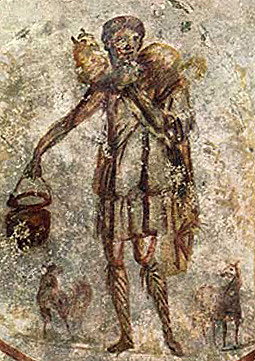
The image became common as Christianity became the official religion of the empire:

The later artist were appropriating an earlier image with an intention of alluding to that image or what it represented. Clearly, Christ was being equated with Apollo.
The appropriations continued. Rather than the image of the effete, bearded, long-haired Jesus, Michelangelo's Jesus was a powerful, muscular, handsome Greco-Roman god:

His handsome visage was cleanly indebted to the famous Apollo Belvedere:
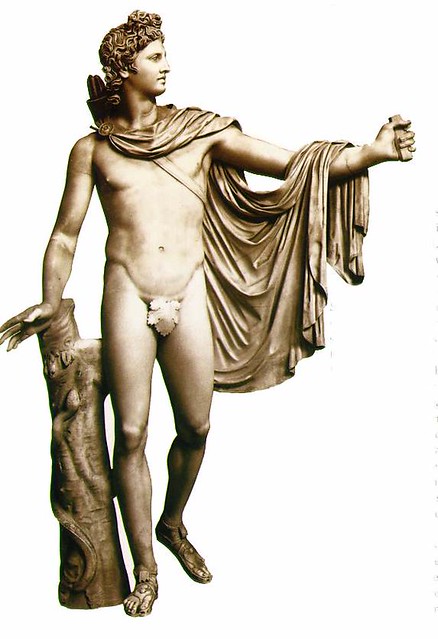
While his arm raised in judgement undoubtedly came from the Augustus of Prima Porta:
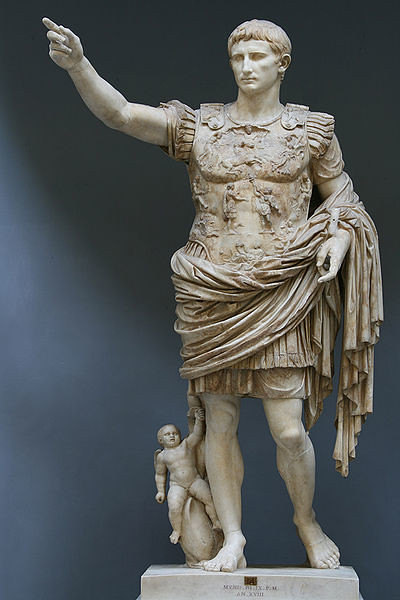
The sculptor of the Augustus image, himself referenced the earlier Orator (a classic work from the Roman Republic) and the Doryphoros by the sculptor Polykleitos:


The intention was clearly to suggest a continuity with an illustrious past through these allusions/appropriations. How are these different than what T.S. Eliot does in The Wasteland... or what Shepherd Fairey is doing?
**********
If you like... we can explore a single image that has continued from the ancient Greeks... and perhaps earlier... through the present day: the Three Graces:
Fragment from ancient Greece:
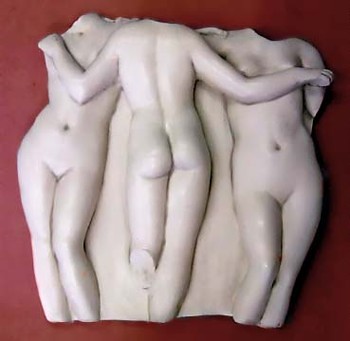
Roman copy after a Greek original:

Painted version from Pompeii:
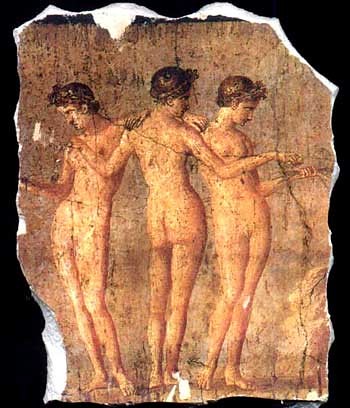
Raphael's youthful version (Italian Renaissance):
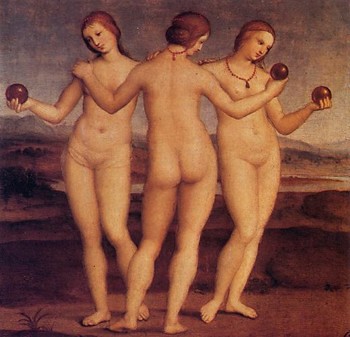
Botticelli employs the graces within his masterpiece, the Primavera:
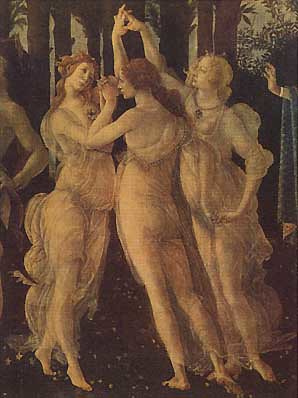
With Rubens, the women are fleshed out into good, sturdy, Belgian girls:
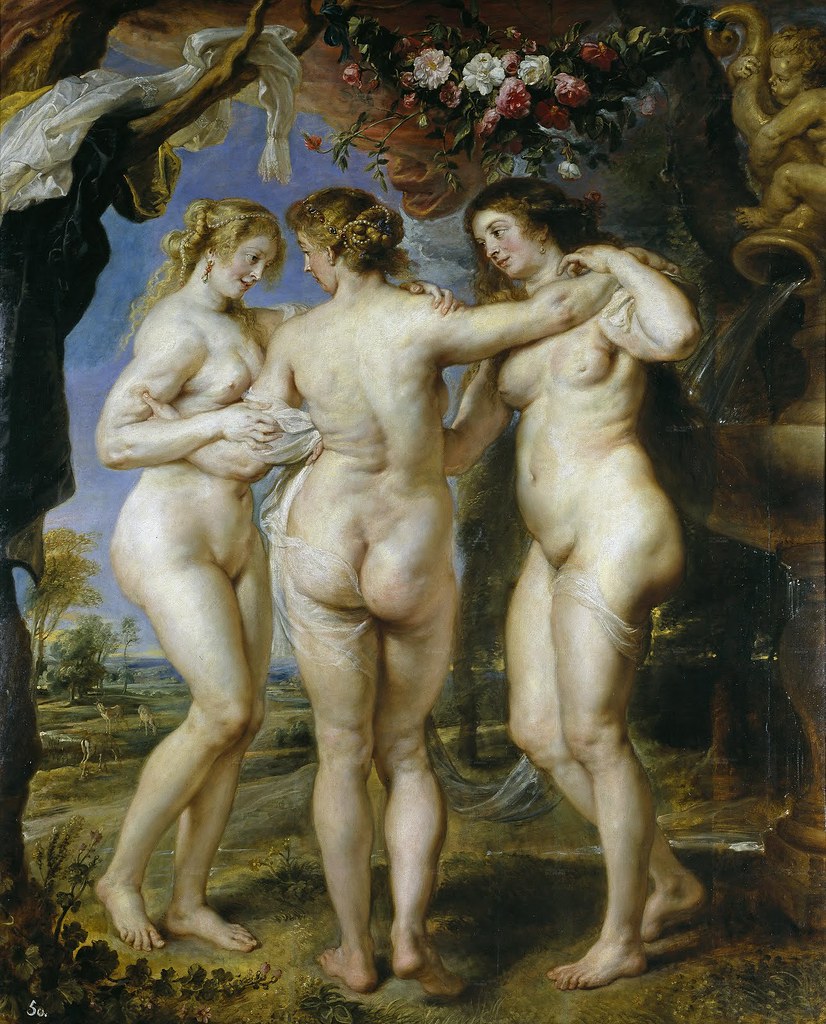
Antonio Canova hones them back down into idealized Neo-Classical goddesses:

While Canova shifts the view to the front... the poses are still the same:
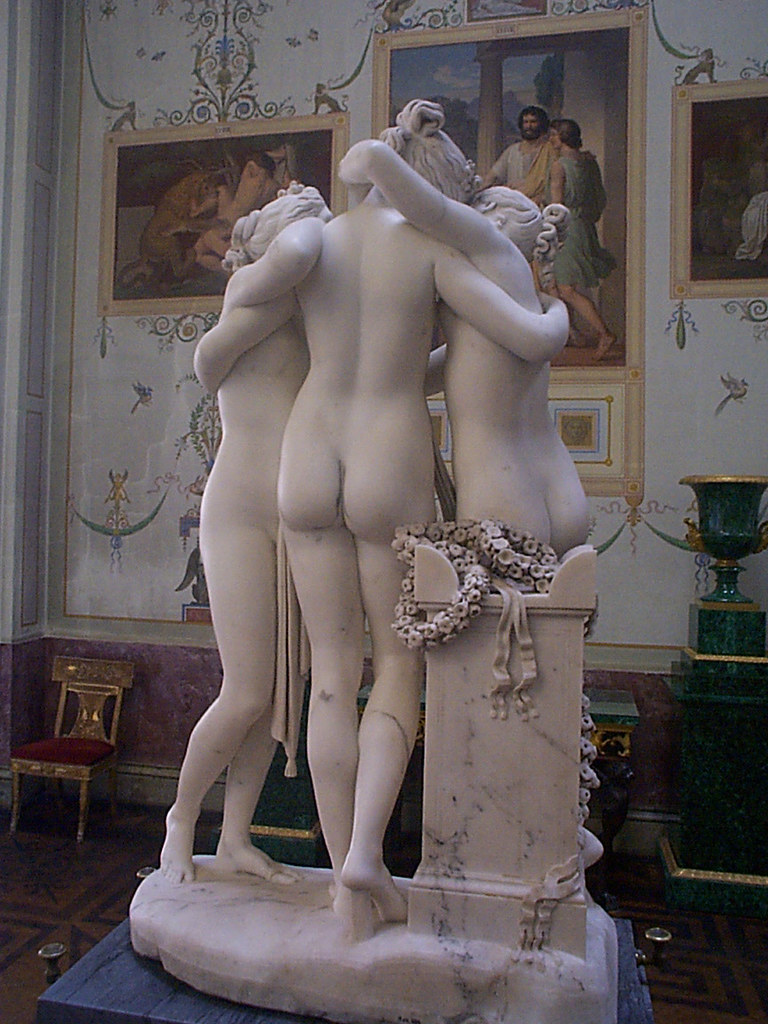
As we enter the 20th century, the Three Graces end up on the beach...
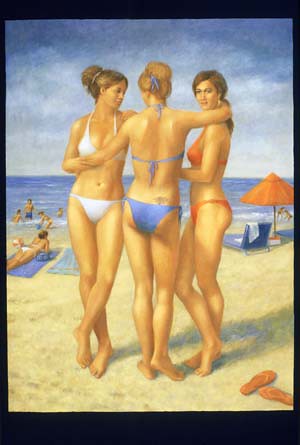
in the tattoo parlors...

or in even stranger locales:
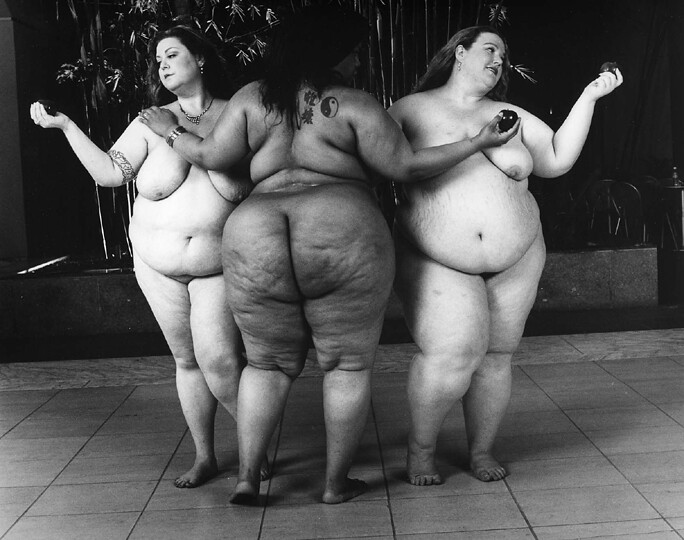
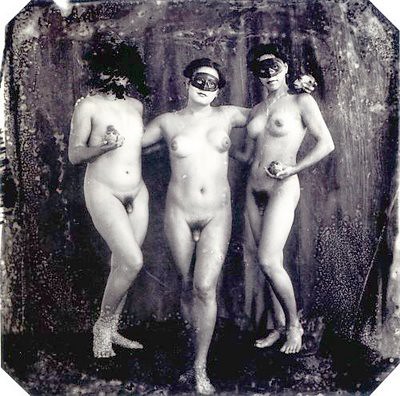
So are we to assume that Rubens or Raphael lacked "originality"... any more than Shakespeare when he "borrowed" from the narrative of the Montague's and Capulets?
Where is the line drawn between appropriation or allusion and plagiarism? Is Manet nothing but a plagiarist:
Titian:
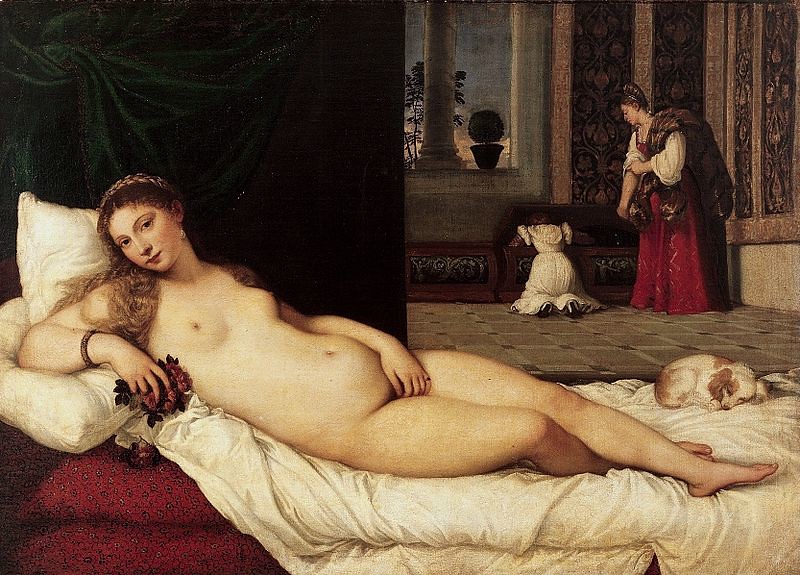
Manet:

Raimondi (after Raphael):
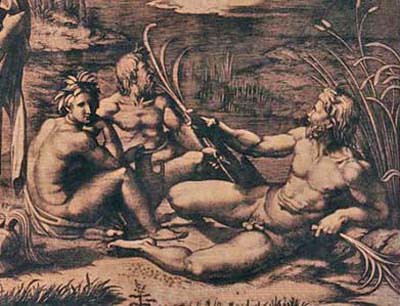
Manet:

and all the hommages/allusions to Manet... they are plagiarized from a plagiarized image?

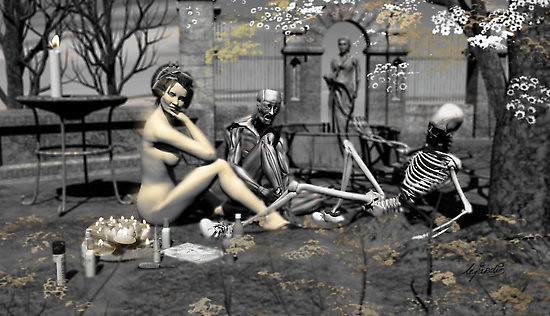
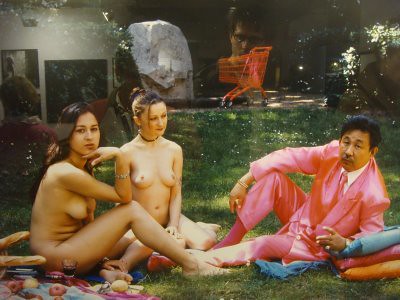
The questions remain as to where the line is drawn between something that is plagiarized and something that is appropriated and turned into something truly new. The copyright laws refuse to even address this issue, arguing that the very act of appropriation of even the smallest detail amounts to plagiarization. Coke has attempted to copyright the red used in its cans and posters. How soon until certain companies attempt to copyright given words?
The second question that has yet to be addressed is just how we set about enforcing copyright laws that we are in agreement with, without curtailing the freedom of the internet and the access to technology. Or do we allow IBM, GM, Citibank, Exxon, and Walmart to censor our technology in the same way as more totalitarian states employ governmental censorship?
One thing you didn't mention concerned American jazz. (Remember the famous line from that well-known critic, Bart Simpson?)* During solos, musicians' improvisation often include melodic lines and chords from pre-existing
standard songs, a practice which Lester Young and numerous others made their own. Rappers do this also, in a practice called "sampling."
In all of these instances, however, the artist and musicians used these quotes to create something entirely new. None took the entire original work and claimed it as his or her own. That's the huge difference.
One of the problems... and one of the reasons that so many are against copyright law... is the absurd manner in which it has been employed. By today's laws, the "sampling" employed by Thelonius Monk or Lester Young is not seen as resulting in something new or original... but is wholly illegal. An artist such as Andy Warhol or James Rosenquist who employ appropriated imagery would face serious legal challenges today... no matter ho removed the work is for the original. Figurative artists... in an era in which working from the live model is quite expensive... find that they must be careful about employing photographic references... no matter how different their final painting is from the original. Certainly taking an original art work is quite different... yet the problem remains as to how to enforce these laws fairly.
Beware of the man with just one book. -Ovid
The man who doesn't read good books has no advantage over the man who can't read them.- Mark Twain
My Blog: Of Delicious Recoil
http://stlukesguild.tumblr.com/

-
Stlukesguild, I hope that by interjecting I'm not distracting from the wonderful work you're doing.
"The absurdity of attempting to enforce certain aspects of copyright law (and I am not calling for a complete abandonment of such, nor even taking a moral stance against them) is that it has led to the corporations, who wish to present themselves as the "victim" (although they usually do this by bemoaning how the artists are being victimized) into taking Draconian... and even illegal actions."
The problem with copyright laws is that they are built for the benefit of corporations. It's the same with patents. My brother designed an ingenious mechanical device and was producing it himself. A larger company stole it from him, and began producing it in China, an inferior version. My brother hadn't patented his design, but it wouldn't have made a difference if he had, because if you can't afford teams of lawyers to defend your patent it is useless to you.
And Delta, my brother somewhat became one of those depressed and demoralized people that you mention on the homelessness thread. But he hasn't and won't end up on public assistance.
Revolte, people should be able to make a profit from their own design. My brother deserved to.
(I hope I'm not derailing the thread. This is me with my emotions getting the best of me again!)
-
Artist and Bibliophile

dup 
-
Registered User


Originally Posted by
stlukesguild

If you like... we can explore a single image that has continued from the ancient Greeks... and perhaps earlier... through the present day
Let me begin by reminding followers of this thread that my previous post (represented in St. Luke's red-highlighting) pointed to:
1) the ease with which technology allows us to massively share digital media and digital information in general.
2) the fact that technological work-arounds will presumably continue to exist.
3) the fact that the corporations (who are a leading force in the defense of copyright) are absolutely to blame for the outrageous and unfair legislation that has been enacted in regards to copyright.
4) the fact that humankind has been busy appropriating forever--I even suggested that we might not be capable of doing anything creative without recourse to mixing and matching of existing ideas or experiences. (As much as some of the Abstract Expressionists might have tried. Note the "some" and "might" being deployed in the presence of an art expert.)

Originally Posted by
stlukesguild

The questions remain as to where the line is drawn between something that is plagiarized and something that is appropriated and turned into something truly new. The copyright laws refuse to even address this issue, arguing that the very act of appropriation of even the smallest detail amounts to plagiarization. Coke has attempted to copyright the red used in its cans and posters. How soon until certain companies attempt to copyright given words?
The second question that has yet to be addressed is just how we set about enforcing copyright laws that we are in agreement with, without curtailing the freedom of the internet and the access to technology. Or do we allow IBM, GM, Citibank, Exxon, and Walmart to censor our technology in the same way as more totalitarian states employ governmental censorship?
I share these concerns completely. The corporations absolutely should not be completely in charge of our technological future. (And I certainly would not argue in favor of Coke owning a shade of red, or that Disney be allowed to extend ownership of Mickey Mouse's image to whatever distant date they can warp the entire world of copyright to include.) The argument that the slippery slope must lead one way or the other to an extreme degree (that ANY appropriation is "theft", or that appropriation is NEVER "theft") is overly reductive, although it might be a comfort to a greedy or envious heart, and/or a tired mind.
But if we put enforcement in the hands of a government agency, with government oversight of it, accountable to courts, the freedom of information act, and political criticism--how worthy would be the objections? Would it amount to censorship? How? I mean, X-Rated material might be something to keep away from children, etc., and plagiarism and wide-spread sharing of media from a single shared copy could be discouraged/punished. But where would the censorship come in?
It would be easy to cry out "Big Brother" here, but Orwell didn't describe a democracy in 1984. And using the internet is a choice, of course (it isn't a technology installed and forced on us by the government). The internet might seem like a necessity, and perhaps effectively is a necessity for many people (and more so every day)--but the same is true of public roads and highways, where we find traffic police, marked lanes, and laws requiring seatbelts. So let's not say that seatbelts and drunk-driving laws restrict our freedoms in such a way as to present a slippery slope to Orwellian horror (I know the suggestion hasn't been made, I'm just trying to forestall it before the debate gets too spread out). I think the Orwellian horror would actually be far more likely if we keep the government out of the game (or at least officially out of the game... Because the government will be in the game, whether we might want to have a better possibility of holding them accountable or not).
Currently, technology exists to automatically track the speed of drivers at certain points along some road, or detect if a driver has run a red light at an intersection. Tickets can be dispensed in this manner, with no human traffic cop being present at the time. Most of us are probably (quite!) familiar with this sort of thing--and a key point about it is that the infraction results in a photo of the vehicle sufficient to get the license plate number necessary for the issuance of the ticket.
Other drivers are not "tracked" by this sort of monitoring (their speed or presence might be measured, but there is no tracking of WHO they are). Further, drivers discussing whether or not the current president is great or terrible, or planning a terrorist attack somewhere are not detected via this sort of monitoring. This sort of monitoring of file transfers (most likely, some percentage of them) could be done with certain algorithms, in addition to whatever human "investigators" we (a democratic "we") might find it reasonable to have deployed. I'm not saying that it would be unimaginable that there could be abuses in this sort of monitoring, but I don't think that condensing our fears onto a government-run 1984 situation is the right response. In fact, if we want a safer internet, with greater control over how our online life is observed and "used" by others, and how our identities and privacy are protected, an elected government that can be held accountable on these issues is probably a powerful tool in our favor. And this scenario doesn't require complete government ownership of the internet--current service providers would just need to comply with certain requirements (as happens already).
I don't mean to present a "there won't be any problems" sort of case here. Of course there will be legal wrangling, and cases of abuse and injustice. But I think it would be better than if we didn't have the government take such measures. Quite likely there will be a lot to discuss about the design and oversight, etc., and it could look much different in the end than I have amateurishly sketched out and hinted at. But, again, it is unfair to simply expect some Big Brother scenario, establishment of some censorship scheme, or some hidden abuse of our privacy.
As far as buying software that enables us to "grab" online images against the intentions of the providers of the image (which is precisely analogous to the example I provided of people using software to record streaming music on the internet), so what? It's largely the same as the cassette tape thing for many people (although the sound quality/picture quality is better preserved). Passing these copies of things on to a few friends needn't capture anyone's attention or be combatted with anything more than some "you're a naughty boy" PSA's.
Frankly, I'd be happier if it were some of the artistic Guilds out there, and companies like ASCAP and BMI that were leading the fight for sensible copyright legislation, rather than the giant media corporations. It would be a lot more dignified, and would probably win a lot more sympathy (in comparison to the $19 CD contingent). But it isn't just Disney and Warner Brothers that we need to be worried about, as we decide how we move forward. At the moment, Facebook, Google, Apple, Amazon, etc. are the corporations that are making headlines, in regards to our privacy and security/control of private information. In all of these cases, the presence and authority of a government that is accountable to the people is useful, and should be deployed in order to protect citizens from threats that are greater (or more technologically skilled) than particular individuals themselves.
What do we do about copyright protection (and protection of invention patents, etc.)? Well, we shouldn't dispense with the protections it provides simply for the sake of punishing the ugly corporations that have made a mockery of it. Nor should we reflexively imagine that it is some sort of toehold for Big Brother.

Originally Posted by
Vonny

The problem with copyright laws is that they are built for the benefit of corporations. It's the same with patents. My brother designed an ingenious mechanical device and was producing it himself. A larger company stole it from him, and began producing it in China, an inferior version. My brother hadn't patented his design, but it wouldn't have made a difference if he had, because if you can't afford teams of lawyers to defend your patent it is useless to you.
That's a really sad story, Vonny. I think it's worth considering the help that a patent might have given though. Of course, discussing copyright law over production occurring in China is to discuss a entirely specific set of problems. But, in the U.S., for example, a patent might have provided lawyers good reason to take on your brother's case (no matter how poor he is), depending on the case's merit and the amount of money involved. If the patent were for something that had resulted in a mere $1,000 of sales/revenue, probably no lawyer would've cared to take the case on (not that it wouldn't have represented an injustice, of course). But if the potential settlement or award would be in the millions (or the tens of thousands, against a smaller company for example?), then the patent could have helped lawyers and your brother get compensation.
-

Originally Posted by
stlukesguild

dup

I don't understand. I'm not really used to forums. What does this mean?
Bill, I will explain a bit more perhaps further along in the thread, but I think it would detract from the thread at this point. Also, I think that patent law is a bit different than copyright law.
Also, I haven't read the entire thread so I hope this comment fits, but Stlukesguild, you said that corporations claim they are protecting the artists. What artists?? I asked my brother once how Madonna got so famous. He said, "Because, I think, at one time she looked good in her underwear."
I think the important thing is that the "little" people, (sorry, I can't talk on your level, especially when I'm nervous) who create great things should somehow be protected, such as the people who have written amazing poetry on this website.
I have practically memorized some of the poems, but I'd never present them to someone else and pretend I wrote them.
Corporate practices are driving out the real talent. But I think the problem will only get worse, and not better.
-

Originally Posted by
Vonny

Stlukesguild, I hope that by interjecting I'm not distracting from the wonderful work you're doing.
"The absurdity of attempting to enforce certain aspects of copyright law (and I am not calling for a complete abandonment of such, nor even taking a moral stance against them) is that it has led to the corporations, who wish to present themselves as the "victim" (although they usually do this by bemoaning how the artists are being victimized) into taking Draconian... and even illegal actions."
The problem with copyright laws is that they are built for the benefit of corporations. It's the same with patents. My brother designed an ingenious mechanical device and was producing it himself. A larger company stole it from him, and began producing it in China, an inferior version. My brother hadn't patented his design, but it wouldn't have made a difference if he had, because if you can't afford teams of lawyers to defend your patent it is useless to you.
And Delta, my brother somewhat became one of those depressed and demoralized people that you mention on the homelessness thread. But he hasn't and won't end up on public assistance.
Revolte, people should be able to make a profit from their own design. My brother deserved to.
(I hope I'm not derailing the thread. This is me with my emotions getting the best of me again!)
Dear Vonny, I am with you on this matter. It's "Us" little people who get kicked in the "behind" when our work is misused in any way or form. There has to be a better way to protect the "Little" people from tyrants such as the "Giants" that stole your brother's work.
Now in reference to me... Well I have the heart and soul for peotry, just not the education. So I have to say I am an easy target. My work can be taken and toyed with, by these so-called Giants or Intellects. As well as your brother who did not have the finance to hire such prestigious laywers to aid him through his ordeal.
So I gues Vonny... Your brother and I are just going to have to take it... Well, I don't really want to say the word, but you know what I mean. This is one reason why I refuse to upload any of my work online. Here in Oz they claim your work is copyrighted by you the very second it is written or produced by you... But once again... It isn't for the little people.
-
Registered User


Originally Posted by
Maryd.

So I gues Vonny... Your brother and I are just going to have to take it... Well, I don't really want to say the word, but you know what I mean. This is one reason why I refuse to upload any of my work online. Here in Oz they claim your work is copyrighted by you the very second it is written or produced by you... But once again... It isn't for the little people.

I already mentioned the offence caused by seeing my poetry on another poetry forum by a name I couldn't remember. I cannot imagine how I would feel to flick through the pages of a book in a bookshop and see my work there under the name of a person other than myself. 
I have thought about how to protect my work while it is online. I know I can get the mods to delete it all - esp if I want to get published. The point is, there is alot of discussion about the concept of publish. At uni, it is agreed that once you click submit on the web, your work is published, which is a pain when asked by mags and other publishing areas if the piece has been published elsewhere. It does include the net. I can get rid of it all but once somebody has cut and pasted it, I'm doomed.
Before sunlight can shine through a window, the blinds must be raised - American Proverb
-

Originally Posted by
Delta40

I already mentioned the offence caused by seeing my poetry on another poetry forum by a name I couldn't remember. I cannot imagine how I would feel to flick through the pages of a book in a bookshop and see my work there under the name of a person other than myself.

I have thought about how to protect my work while it is online. I know I can get the mods to delete it all - esp if I want to get published. The point is, there is alot of discussion about the concept of publish. At uni, it is agreed that once you click submit on the web, your work is published, which is a pain when asked by mags and other publishing areas if the piece has been published elsewhere. It does include the net. I can get rid of it all but once somebody has cut and pasted it, I'm doomed.
Dearest Delta... So don't upload your good stuff. I didn't. I kept that work safe and as for trusting a certain few people privately. Well I did. But once again due to some other horrible thing that happened to me online in the past. I didn't give them too much personal info or data... Nor did I give them my good work. I am not a professional, needless to say my work is not that great. But my ideas are somewhat interesting. Now I just keep to myself. Which is sad really. I have one manuscript floating in the hands of a family memeber who is already in the writing industry. The family member in question, I can trust. He isn't a fiend or down right dirty, like some; of which I have met in the past. But that is not to say he won't steal the idea of my manuscript. In fact is, the idea is quite good. The writing on the other hand, well... Isn't "All that!" So again, it might leave me vulnerable and useless... And that isn't even online!
Similar Threads
-
By NikolaiI in forum Philosophical Literature
Replies: 298
Last Post: 09-26-2011, 09:46 AM
-
By Gladys in forum The Portrait of a Lady
Replies: 0
Last Post: 03-23-2011, 02:48 AM
-
By RoronoaZoro in forum The Count of Monte Cristo
Replies: 35
Last Post: 01-11-2010, 10:56 AM
-
By lexyt95 in forum General Chat
Replies: 0
Last Post: 06-15-2009, 04:29 PM
-
By blazeofglory in forum Personal Poetry
Replies: 4
Last Post: 01-21-2009, 03:00 AM
 Posting Permissions
Posting Permissions
- You may not post new threads
- You may not post replies
- You may not post attachments
- You may not edit your posts
-
Forum Rules
























 Reply With Quote
Reply With Quote































